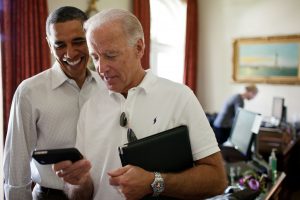Editor’s Note: This is the second article in a three-part series. The first article is available here.
Beyond the reasons discussed in my previous column, another reason a U.S.-China détente may be likely in 2021 is the possible election of Joseph Biden. Biden’s China policy will be more rational and pragmatic than that of Donald Trump. First, Biden’s personal style, as vice president and as an experienced career politician under the Obama administration, was more moderate and rational than that of Trump. Biden will not be as unilateral in his foreign policy as Trump either. Moreover, in contrast to Trump’s harsh treatment of U.S. allies, Biden has placed greater emphasis on dealing with the challenges posed by China’s rise through closer political coordination with American partners and traditional allies within multilateral frameworks such as NATO, the Group of Seven, and others among Indo-Pacific countries.
Biden’s China policy team is more mature politically than Trump’s hawkish team, too. Although Biden has not finished with his China team’s construction — nor has he come to any discussions on the candidates for his national security adviser or assistant secretary of state for Asia Pacific affairs — as a former vice president during the Obama era, he was one of the participants in the “pivot” or “rebalance” to Asia strategy. He has also been in close contact with China experts and foreign policy strategists across numerous think tanks, such as the Brookings Institution. Therefore, it is not difficult to predict the basic framework of Biden’s future China policy team. If Biden succeeds in entering the White House next year, it will be highly likely that some of the “China Hands” — rational, pragmatic experts on China — who were promoted during the Obama administration would replace hawkish strategists such as Peter Navarro and Steve Bannon as policy participants in this new era. For both countries, this is good and will help ease tensions that have been simmering for the past two years as a more pragmatic White House strategy team will keep the relationship within a rational and diplomatic framework rather than the volatile and acrimonious manner of the Trump era.
In addition, in terms of interactions and communications with China, Biden and the Democratic Party have a relatively more positive and open attitude. This is helpful because it will widen and smooth the channel of dialogues between elites on both sides. The mutual understanding between the leadership and society at large would also largely benefit from this attitude. By contrast, during the Trump administration, the United States stalled effective communication with China. A variety of methods, including exaggerating the Chinese threat, arguing that China was seeking expansion, and other false claims have often greatly mislead the political elite and public in the United States. This is one of the main reasons for the rising antagonism between the United States and China, which has been fueled further by trade disputes.
If Biden is elected in 2020, he will first face a host of domestic issues, including climate change, racial issues, social justice in the presence of white supremacists, and a domestic economic recovery after the pandemic. For Biden’s team, domestic political and economic problems will largely divert away American political energy.
So, Biden’s political team, driven by the need to deliver on campaign promises and satisfy domestic voters, will focus on the domestic front first. In terms of China policy, although Biden and the Democratic Party have their own containment plans against China, the American economic and technological suppression of China is bound to be weakened to a considerable extent due to their priority on dealing with domestic issues. Although there will still be fierce competition between China and the United States after Biden takes office — and even more fierce competition in the high-tech fields — the overall atmosphere of China-U.S. relations will improve to some extent in the short term.

































